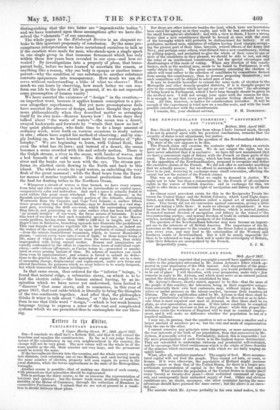fetus Is tot Ebitur.
PARLIAMENTARY REFORM.
8 Upper Harley Street, W., 'Ads April 1857.
Sin—I conclude we shall have a Reform Bill, and that it will extend the franchise and equalize the constituencies. Bo far as I can judge from the nature of the constituency in my own neighbourhood in the country, the change will not be very great. The new voters will on the whole be of the same quality as the old, their number not very large, and the permanent result be nearly the same.
If the boroughs are thrown into the counties, and the whole country cut up into districts, each returning one or two Members, and each having nearly the same number of electors, property will soon regain its power in the rural districts, while the towns approximate to the state of the Metropolitan boroughs.
Another course is possible—that of making one district of each county, with preeanthms that minorities should be represented.
This is perhaps the fairer course, so far as concerns the representation of interests and opinions; but the former tends more decidedly towards the stability of the House of Commons, through the reffieetion of Members in consecutive Parliaments. I submit that we are not at present in a condition to decide between these plans. But there are other interests besides the land, which have not heretofore been cared for among us as they ought, and will be less attended to when the small boroughs are abolished ; and with a view to these, I have a strong desire that a new constituency should be formed at once with the seats of the boroughs which will probably be disfranchised for bribery. If all graduates, medical men, ministers of religion having fixed charges occupying the greater part of their time, lawyers, retired officers of the Army and Navy, and perhaps some others, were formed into a new constituency, voting by polling-papers, and permitted to give the whole of their votes to one or more of the candidates as they pleased, we should be able to test, not only the value of an intellectual constituency, but the special advantages and disadvantages of this mode of voting. When any fraction of this constituency, such as the medical men, needs to be heard in Parliament, it will easily obtain its object. The great uncertainty attending the election of others will tend rather to the selection of candidates by committees formed from among the constituency, than to persons proposing themselves ; and such committees will be obliged to select men of note.
It may be desirable hereafter to extend the same mode of election to the Metropolis and other densely-peopled districts, if it is thought proper to give to the communitiee which are apt to go out "on strike" the advantage of being heard in Parliament, which I have long thought should be given to the medical men. I will not occupy your space with the reasons for this. It is enough to say that every prevalent popular feeling should have its vent. All this, however, is matter for consideration hereafter. It will be enough if the experiment is tried now on a smaller scale, and with the least possible interference with the constituencies. I remain, Sir, your obedient servant, F. H. DICKINSON:


































 Previous page
Previous page